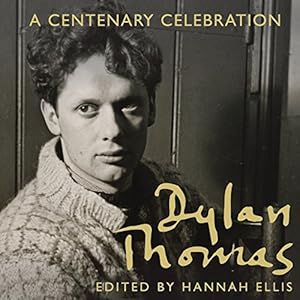New Audiobook: "Dylan Thomas: A Centenary Celebration"
The 100th Anniversary of Dylan Thomas’s Birth took place on the 27th October, 2014, or in relative terms, almost a month ago. Because of the eccentricities of Audible’s publishing schedule, the audiobook of a volume celebrating his centenary year is released today! As the narrator of the aforementioned audiobook, I thought I would write down my own thoughts about it.

I must admit, I was quite delighted when my audition for the Dylan Thomas Centenary book came through, not least because where I live, on the Welsh borders, just outside the bookshop-filled lanes of Hay-on-Wye, Dylan Thomas is a name to conjure with. I already knew from having done the audition, that there were some seriously famous names contributing to the book, and whose words I was going to be voicing. Names as disparate as Python star Terry Jones, celebrated poet and novelist Owen Shears, comedian Griff Rhys Jones, former US President Jimmy Carter and Dr Rowan Williams: the Poet formerly known as the Archbishop of Canterbury. These, along with various Dylan Thomas experts, biographers, and music and literature scholars, all held together by the words of Hannah Ellis, Dylan’s granddaughter.
I would describe myself as a passive fan of Dylan Thomas. I have dipped in and out of his work over the years, both his poetry and prose, and although there is much there that I love, I have never been a truly avid enthusiast, and have therefore never previously immersed myself in the length and breadth of his work, nor in the stories of his youth (beyond his own account of childhood Christmases), nor much of the rest of the eventful life that led to his early demise during a visit to America. I mean, I knew bits and pieces. My great aunt Marie is a huge Dylan Thomas fan, and has for years been telling me about the beauty of the view from his boat-house home in Laugharne, and of the manifold injustices perpetrated on Dylan’s memory by his American agent and biographer, John Malcolm Brinnin (whose work receives short shrift from a couple of the essayists in this book), but so much was new to me that I was able to read most of it with a wholly fresh pair of eyes.
The book itself is splendid. I would recommend it to anyone, however much they know or don’t know about Dylan Thomas, simply because the content is so varied, so fascinating and so moving. There are chapters about Dylan’s life, including an essay on his youthful penchant for plagiarism, his flirtation with the Surrealist movement and his war-time work on propaganda films. There are touching personal pieces from people who knew him, and the families of his closest friends, and many of these are heart-wrenching in the way that they convey the sense of loss felt by so many who were clearly devastated that such a remarkable person had been taken from them so suddenly. While I was recording the audiobook, passages in several chapters took numerous takes, simply because my voice kept breaking into sobs as I read them. There are essays about his work itself, both poetry and prose, where the influences for it came from, and what the legacy of it has been. I had no idea that Dylan Thomas was so big in America, but it seems that the USA embraced him in a way that Britain has been largely reluctant to do until very recently. Too English for the Welsh, and too Welsh for the English Establishment seems to be the received wisdom, although from my own perch on the borders, I have seen evidence of both camps moving to reclaim him, now his star is once again in popular ascendancy.
Another surprise for me was how popular Dylan Thomas is in Australia, and the chapter by Clive Woosnam, the head of the Dylan Thomas Society of Australia was fascinating, and led onto what for me - as a narrator - was the most enjoyable part of the book: a rendition of the opening of “Under Milk Wood”, followed by the opening to its Outback counterpart “Under Mulga Wood”, the rather brilliant “Play for Australian Voices”, written by William Christie. I have no idea what Christie will make of my Australian accent, but I thoroughly enjoyed narrating it.
The final impression that remains in my mind after finishing the book is the personal touch that it contained. Dylan’s granddaughter, Hannah Ellis both edited and compiled the book, stating in her foreword that she had no wish to be a silent figurehead in her grandfather’s centenary year, and her guiding hand is apparent. As well as the contributions from academics and household-names, there are essays and poems written by Dylan’s family. As well as her own commentaries, Hannah includes poems by his daughter (Hannah’s mother, Aeronwy Thomas) that give an insight into what it was like to be Dylan’s daughter, both before and after his death; an essay by Aeronwy’s husband Trefor, which adds another dimension to the sense of living in the shadow - or perhaps the blinding light - of Dylan’s legacy; an utterly heart-rending letter written by Dylan’s mother in the year after not only his death, but that of his father and sister as well.
All in all, Dylan Thomas: A Centenary Celebration is a wonderful book. By turns interesting, thought-provoking, entertaining, deeply moving and sometimes hilariously funny. I feel very proud to have had a part in it.
With thanks to Jon Tregenna, whose assistance with the pronunciations of the multifarious historical spellings of "Laugharne" from his essay was invaluable; and to David N Thomas, not only for the assistance and advice he provided, but also for the essays themselves, which were as entertaining as they were educational.
Dylan Thomas: A Centenary Celebration, edited by Hannah Ellis, is published by Bloomsbury.
The audiobook version, narrated by Malk Williams, is available for download from Audible.